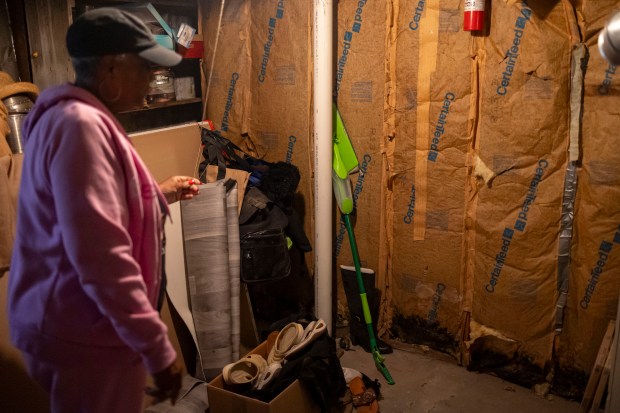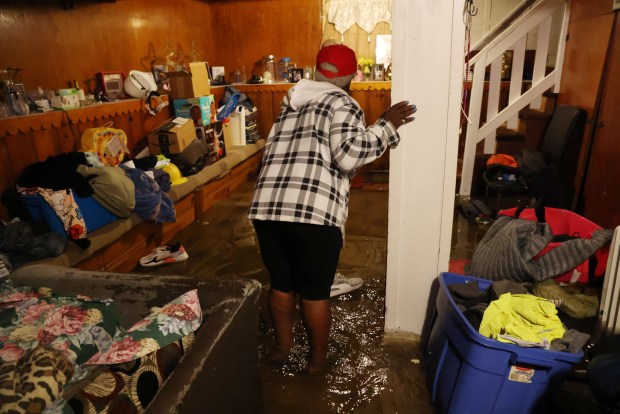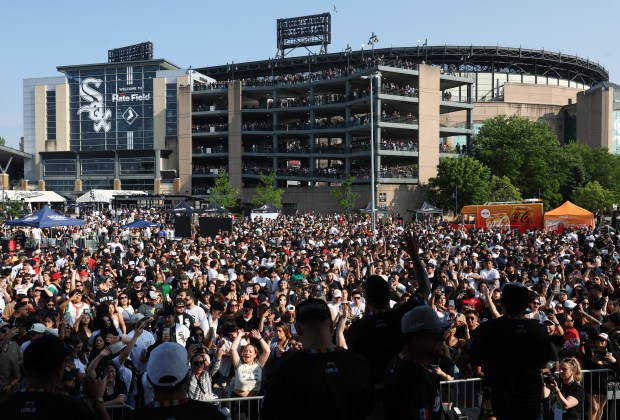Shirley Howard sighed as the rain pounded down in Chicago’s Austin neighborhood Tuesday afternoon. Water seeped into her basement again, right by her new washing machine.
“Some more work has to be done,” she said. “I’m telling you it’s so frustrating.”
It was just over a year ago that she was pulling debris out of a nearby storm drain in a desperate attempt to drain water out of her basement bedroom. Her grandson’s sneakers and notebooks were floating on inches of water.
Since then, her life has been filled with contractors, cleaning supplies and bills. So many bills.
The 70-year-old is among the many West and South Side residents whose basements flooded in a torrential downpour in July 2023. Despite promises of public assistance, many low-income residents, some who are seniors, are still dealing with damages and repairs.
Local stormwater systems were so overwhelmed by 8 inches of rain falling within 12 hours that water rose into thousands of West and South Side basements. In an attempt to alleviate the sewers, officials turned to their outlets of last resort: releasing runoff mixed with human waste into Lake Michigan. Still, in the aftermath, tens of thousands of Chicagoans applied for federal flood assistance.
This week’s damage, caused by less than an inch of rain, was minimal compared with the $8,000 of damage in July 2023. But when promised relief assistance isn’t adequate and flood mitigation efforts flounder, all the destruction compounds.
“It’s never-ending,” said Howard, looking at the latest water to make its way into her home of nearly three decades. When she spoke with the Tribune last year, she was standing in water up to her ankles.
The federal government made $172 million available to help flood victims on the West and South sides. When Howard’s check finally came in early 2024, half a year after the floods, and it was for only $4,400.
She went into debt stripping her carpets, cutting open her walls to replace the insulation and buying that new washing machine. Sadly, her family photo albums didn’t survive the 3 feet of sewage water that rushed into her basement. No money could save them. Meanwhile, the repairs she could barely afford struggled to withstand Tuesday’s much less violent storm.
Howard hoped to alleviate some of her debt in July when Mayor Brandon Johnson announced his administration was making $5 million available from the city’s corporate fund to assist flood victims. The city said the funding was intended to support seniors like her, after all. But she was denied.
Homeowners who have received federal and state assistance are “generally” not eligible for the new municipal assistance, city spokesperson Peter Strabazzabosco told the Tribune.
To be eligible, Strabazzabosco said, individuals must also own and occupy homes within the hardest-hit portions of the flood area, have household incomes that do not exceed the Chicago area’s median income and be current on property taxes.
Her neighbor Edie Jacobs, 78, received $10,000 from the Federal Emergency Management Agency to repair her basement. It helped, but, similarly, wasn’t enough.
One of her bathroom walls still needs to be redone. There’s a circular stain where the water seeped through the insulation. She’s worried there might be mold, but it’s too expensive to fix.
Jacobs also thought she might finish her basement repairs money from the $5 million the city made available, but there was no formal application process, so she didn’t know how to tap into the funds.
The city Department of Housing has already worked with local community organizations to identify 200 households in need, Strabazzabosco told the Tribune on Wednesday. Repairs have begun on 20 basements at an average cost of $25,000 per home, significantly more than Jacobs and Howard received from the federal government.

Affected homeowners can still contact the Department of Housing and their ward offices to be placed on a waitlist for city assistance, pending funding availability, Strabazzabosco said.
Jacobs said she’s been making calls to the city for weeks to see if she qualifies, but no one answers. Over a year since the flood damage, the bureaucracy is finally wearing her down.
“I just have to let it go because there’s nothing I can do,” she said.
Restoring her basements from the July 2023 floods does not solve the root problem, however.
Severe flooding is anticipated to increasingly threaten Howard, Jacobs and their neighbors’ homes.
Climate change is making intense rainfall more frequent because warm air holds moisture. Total precipitation statewide already increased 15% from 1895 to 2019, according to the Illinois Department of Natural Resources. Just this month, the Biden administration authorized another round of FEMA funding for residents in seven Illinois counties — including Cook County — affected by severe rain this July.
Chicago’s West Side sits in a floodplain, meaning it always experiences greater rainfall than the rest of the Chicago area. Historically, high-value properties are not built in floodplains, so the aging infrastructure in West Side communities was likely never best suited to endure floods.
As climate change worsens, underinvested communities on the West Sides will likely continue paying the highest price for heavy rainfall.




